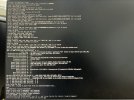SHA512 is correct.
I used dd command and it looks success.
Hmm, not sure if sha512 is totally correct though. Is this "improperly formatted" message normal?
% sha512sum -c CHECKSUM.SHA512-FreeBSD-14.2-RELEASE-arm64-aarch64-RPI FreeBSD-14.2-RELEASE-arm64-aarch64-RPI.img.xz
FreeBSD-14.2-RELEASE-arm64-aarch64-RPI.img.xz: OK
sha512sum: WARNING: 2984186 lines are improperly formatted

